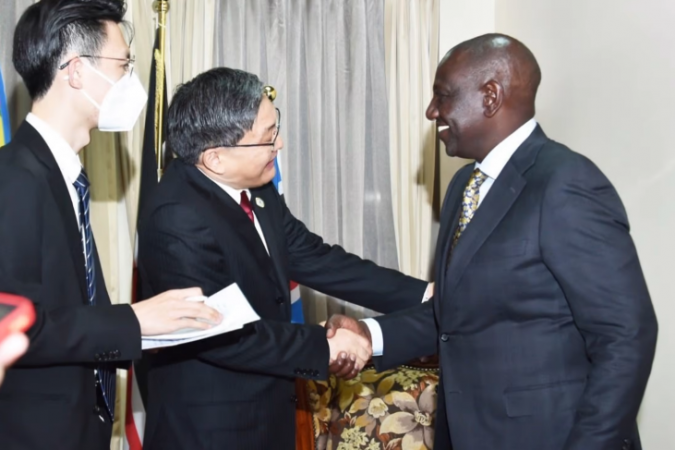
Kenya: Kenya's newly-elected President William Ruto has indicated that the East African country will continue to rely on China to grow and develop its infrastructure, reversing the hostile tone of its campaign.
China is Kenya's largest bilateral lender and has provided funding for various infrastructure projects, including highways and railroads. However, during the presidential campaign, Chinese lending emerged as a significant political issue, with Ruto blaming Kenya's debt crisis for those loans.
However, Ruto said Kenya and China would expand these ties "for the mutual benefit of our countries, including infrastructure, agriculture, education - among other broad arrays of issues", in a meeting with Beijing's Special Representative on African Affairs Liu Yuxi. during the meeting. Nairobi on Monday.
"We value our strong friendship with China," Ruto said of Kenya and China.
"I firmly believe that China-Kenya cooperation will bring greater benefits to both our countries and peoples," Liu said in response. The friendship and cooperation between China and Kenya will continue.
Liu led a Chinese delegation to Kenya to witness the inauguration of Ruto. Ruto defeated Raila Odinga in a tight election on 9 August, which was later upheld by the Kenyan Supreme Court.
In Nairobi on Tuesday, Ruto was sworn in as the country's fifth president, replacing Uhuru Kenyatta, who held the office for a maximum of two terms of five years.
Several African heads of state and world leaders attended the event, along with a US delegation headed by Trade Representative, Catherine Tai. Following his election, Ruto promised to stabilize Kenya's food prices, support the development of small businesses and increase employment.
“Our immediate agenda is to create a conducive environment for business and enterprise, crime-free means of subsistence, and help people in the informal sector organize themselves into stable, viable and credit-worthy business entities,” he said. They said.
Chinese President Xi Jinping congratulated President Ruto and said that he is "ready to work with President Ruto to advance the development of the China-Kenya Comprehensive Strategic Cooperative Partnership."
Kenya's economy has been battered by high unemployment, massive public debt, and rapid inflation, all of which are driving up the prices of fuel and basic necessities. Ruto, 55, is currently taking over.
Ruto, who served as vice president since 2013, took a tough stance towards China during the campaign, blaming Beijing for Kenya's debt issues and foreigners including Chinese working illegally and running small retail in Kenya. Accused of threatening to deport civilians. Businesses that Kenyans could run.
Additionally, Ruto promised to disclose all agreements that Kenya signed with China for important projects.
According to Kathleen Kloss, author of Political Violence in Kenya and assistant professor of conflict resolution at Uppsala University in Sweden, if Ruto "follows these statements, Kenya could be headed for a more contentious relationship with China."
This can prevent further growth while limiting future debt obligations.
Beijing has provided significant funding for large-scale infrastructure projects in Kenya, such as the US$4.7 billion railway connecting the central Rift Valley city of Naivasha to Nairobi and the coastal city of Mombasa.
Ruto has vowed to issue contracts for a number of projects, including a railway that was funded by the Export-Import Bank of China.
Wu Peng, director general of the Chinese Foreign Ministry's Department of African Affairs, however, insisted in Beijing last month that "the agreement we signed contained a commercial secret agreement. It is a very specific business practice."
Wu claimed that if Kenya made the agreement public, it would be a violation. “The foundation of doing business is a sense of contract. How can we conduct business if the spirit of contract is absent?
Additionally, China provided funding and construction support for the 27.1 km (16.8 mi) Nairobi Expressway, which was to be built by the China Road and Bridge Corporation at a cost of US$688 million.
Kenya's debt to China increased from US$2.1 billion in 2015 to around US$6.4 billion in December 2021, accounting for about two-thirds of all bilateral debt.
Ruto recently indicated that it would try to borrow as much domestically, rather than borrowing abroad.
Instead of borrowing from other countries, Ruto said last week, "I look forward to the day when we can borrow from the savings of the people of Kenya to drive our development." "I'm taking over a nation with a huge debt load, and our economy isn't doing well. Stop digging if you find yourself in a hole.
The Oxford Economics consultancy's analysts cautioned that enmity toward China at this time, when debt is expected to increase, would be dangerous.
The International Monetary Fund, among other Western governments and organisations, would be pleased with Ruto's promise to publish Kenyan government contracts with China, but Shani Smit, an economist at the company, recently wrote that carrying out this promise and threatening to deport illegal Chinese workers would severely strain relations between the two nations.
If Western funding is to fill the potential funding gap in the event that Kenya's relations with China deteriorate, "Kenya's commitment to structural reforms will need to translate into clear progress," Smit said.
During previous election campaigns, African leaders have taken a tough stance toward China only to back down. In the early 2000s, Michael Sata, a former president of Zambia, allegedly raged against Chinese "profiteers," declaring that "Zambia has become a province of China."
But after winning the presidency, Sata appreciated Beijing's continued support of infrastructure development.
How to Plan the Best Masai Mara Packages from Bangalore
How much debt will China write off through its interest-free loan programme to Africa?
1xBet is the new Official Regional Partner of LOSC Lille